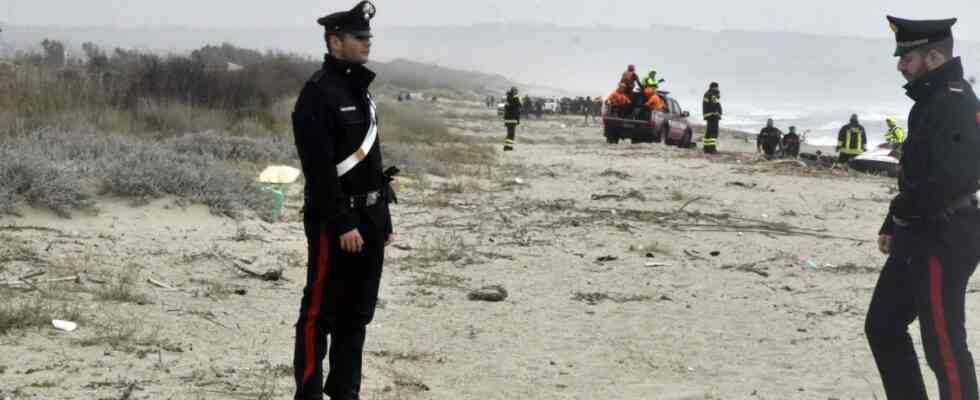A refugee boat has capsized off the coast of Steccato di Cutro, a town in Calabria. The sea was very rough, the waves were high, as is often the case in winter. The boat with migrants from Iran, Afghanistan and Pakistan apparently broke on rocks just before the destination. 80 people were rescued, of whom 20 were taken to hospital, a provincial government official told Reuters. It was initially unclear how many refugees could have died this time on the dangerous route through the Mediterranean. Survivors reported that they were 250 at the beginning of the journey, others spoke of 180. They left Turkey. By Sunday noon, the Italian coast guard recovered 58 bodies, the sea had washed them onto the beaches. There were many children, including a newborn.
“Calabria is in mourning because of this terrible tragedy,” wrote Roberto Occhiuto, the Calabrian regional president of Silvio Berlusconi’s right-wing Forza Italia party, in a communiqué, adding, “Where is Europe?”
The crossings to Italy have recently increased again – and this despite difficult weather. Most people continue to come from Libya and Tunisia, fleeing the political turmoil in the North African countries. 85 to 90 percent of the migrants who make it to Italy make it on board their own boats or are rescued from distress and brought to safety by freighters, the Italian Navy or the Italian Coast Guard. The rest, about 10 to 15 percent, is transported by non-governmental organizations.
Yet Italy’s right-wing government focuses almost exclusively on these NGOs in its fight against what it calls “illegal immigration.” Prime Minister Giorgia Meloni of the post-fascist Fratelli d’Italia recently said again: “It’s more of a ferry service than an ambulance service.” The term “taxis of the sea” used to be popular. But the meaning is the same: Italy’s right-wing accuses the NGOs of being accomplices of North African smugglers’ gangs – without any indication whatsoever – politicians are therefore openly obstructing the work of the activists.
The new law decree on Italy’s handling of sea rescuers, which was only recently definitively approved by the Roman Parliament, prohibits the organizations, among other things, from carrying out more than one rescue operation per mission. So once they have rescued people, they have to ask for a safe harbor in Rome and head for it immediately. On the way there, they are not allowed to take in any new migrants, even if they meet some in distress.
If they violate this norm, they will be fined between 10,000 and 50,000 euros and their ship will be detained for a period of time. This happened now for the first time GeoBarents from Doctors Without Borders. They had initially rescued 69 migrants in distress off Libya and taken another 168 on board on their way to La Spezia. The crew was fined 10,000 euros GeoBarents Detained for 20 days in the Sicilian port of Augusta. “It is unacceptable that we are being punished for saving lives,” MSF said.
The allocation of La Spezia in northern Liguria as a safe haven is also part of the new strategy of the Italian government and its Interior Minister Matteo Piantedosi in their measurements with the NGOs. So that their ships cannot cruise off Libya as often as possible, they are sent north instead of to Sicilian, Apulian or Calabrian ports: to La Spezia or Carrara on the Tyrrhenian coast, for example, or to Ancona and Ravenna in the upper part of the Adriatic coast. So they are on the road for days to bring the migrants to safety – using unnecessary detours.

